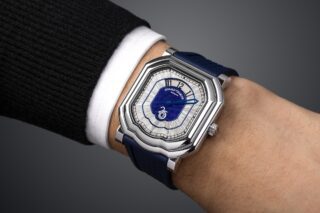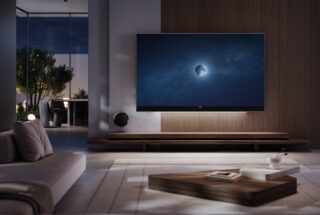This website uses cookies so that we can provide you with the best user experience possible. Cookie information is stored in your browser and performs functions such as recognising you when you return to our website and helping our team to understand which sections of the website you find most interesting and useful.
Netflix star Amaka Okafor on playing DS Hasan in Bodies
By Tessa Crowley | 19 October 2023 | Arts, Culture
As Netflix new time-travel crime series Bodies hits our television screens, we sit down with Amaka Okafor to discuss three-dimensional characters, and what makes good acting
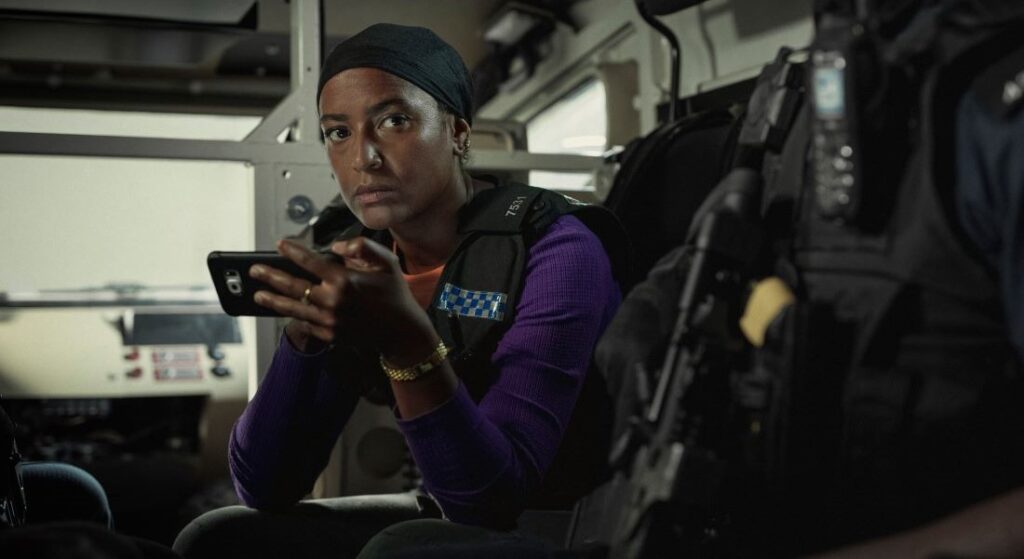
Amaka, you’re playing DS Hasan, one of four lead detective roles in Netflix new crime series Bodies. Without giving too many spoilers, can you tell us about what attracted you to the show?
When the audition came through I read the pilot and, I’m quite a slow reader, honestly I whipped through it so quickly. When I got to the end I was like “I need to know what happens next. Yeah I want this job, but also, what happens?!”. It’s so brilliant.
The show’s split over four different time periods so it’s quite genre-defying. The jumps in time are too big for one person to play the main detective so my character’s the detective for now and she’s amazing. She’s a single mum, she lives with her dad, she’s really passionate, she’s Muslim, she’s kind, she has a huge heart and really believes in people. She definitely goes above and beyond what she probably should do and she gets in trouble for that…
It sounds like the role really appealed to you. Was there a personal resonance there for you?
I feel a lot of similarity. I’m a single mum and I was raised mainly by my dad so I’ve always had a really close relationship with him.
For me it’s also that she’s not white but it’s not issue based. She has faith, it’s not about the fact she has faith; she’s not white, it’s not about the fact that she’s not white; but these are huge parts of her identity. They influence how she works, they identify her with the people she works with and the community that she serves, and she feels really embedded in that community.
She’s a three course meal of a character and so three dimensional, yet it left a lot of space for me to step in and bring myself to it.
How did you prepare for the role?
For me, the writing was amazing. When the writing is incredible it gives you freedom to just be and almost just to say the words.
I’ve played a lot of police detectives so I was like, I can do that bit . [The preparation] was around my own insecurities and the walls that I put up inside myself that stopped me from being able to be free. It was coming to work every day and saying to myself “you are enough, you are good, you are here for a reason”. The things we do that mess ourselves up, my prep for this was to just get rid of those each day.
It sounds as though it was a powerful role for you.
I loved it so much. It was a real challenge childcare wise, that was the hard part, but the crew – every single member of the crew were just diamonds. There was nobody who I was like “Oh god, I hope I don’t end up sitting next to that person today”. I loved it!
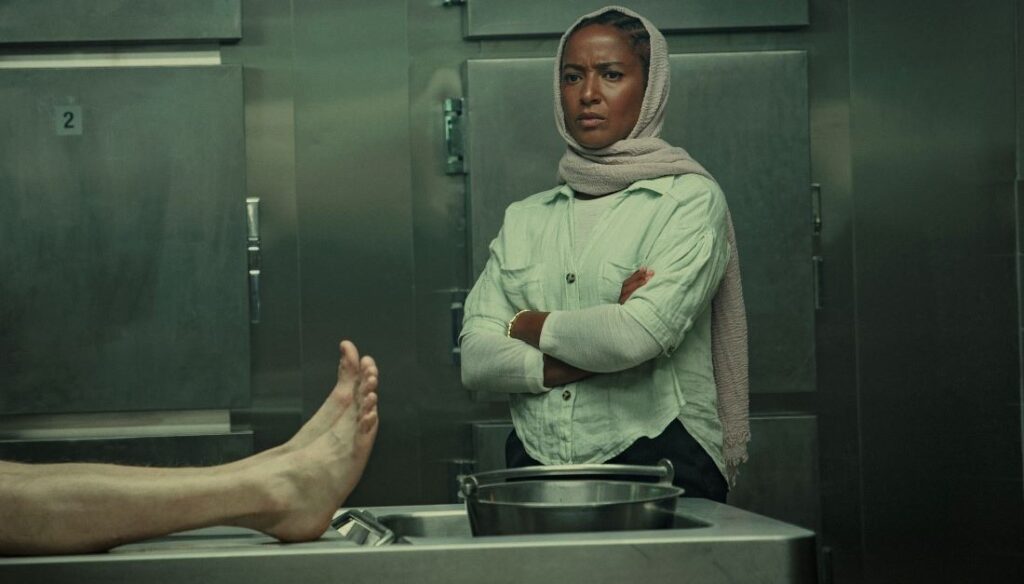
You have a lot of stage experience, how was working on a screen production different? Were there any moments where something new clicked for you?
Yes, there was one really clear moment. There’s one scene where I’m looking at computer monitors to look on CCTV. It’s a bank of monitors and I’m walking along, looking, nothing on that monitor, looking, nothing on that monitor… The camera’s on the other side of the monitors, catching me in the gaps as I’m walking between the screens.
I did it a couple of times, and our lead director Marco was like “Amaka, you are hiding. You’re going behind the monitor and then you’re running through the gap and getting to the other one, then you’re running through the gap… let us see you”.
I think there’s a deeper thing going on here. I’m sort of marginalised in this society – I’m a women, I’m mixed race, I’m not white, I’m not part of a majority – and that’s often reflected in the parts that you play. I spend my life going “Oh, when am I going to get seen?”. And suddenly you’re in the middle, everyone is looking at you, and you’re like “Ok… not directly at me though!”.
It was such a massive turning point for me.
Do you think this role and that experience has impacted you in your personal life too?
Yeah, just to take up a little bit more space. Not loads because it’s not in my nature. But not make myself smaller than I need to.
You have a daughter, who’s clearly very important to you. Does being a mum make a difference to the work you do?
Yes, in many, many different ways. On a practical level it’s made me more discerning with the jobs I take. It has to be worth being away from home. Also, being an actor, our job is to portray the human experience – what it is to be a human being – and raising a baby, having a child is one of those experiences. Just going through labour is something I will never forget, and made me a little bit wilder.
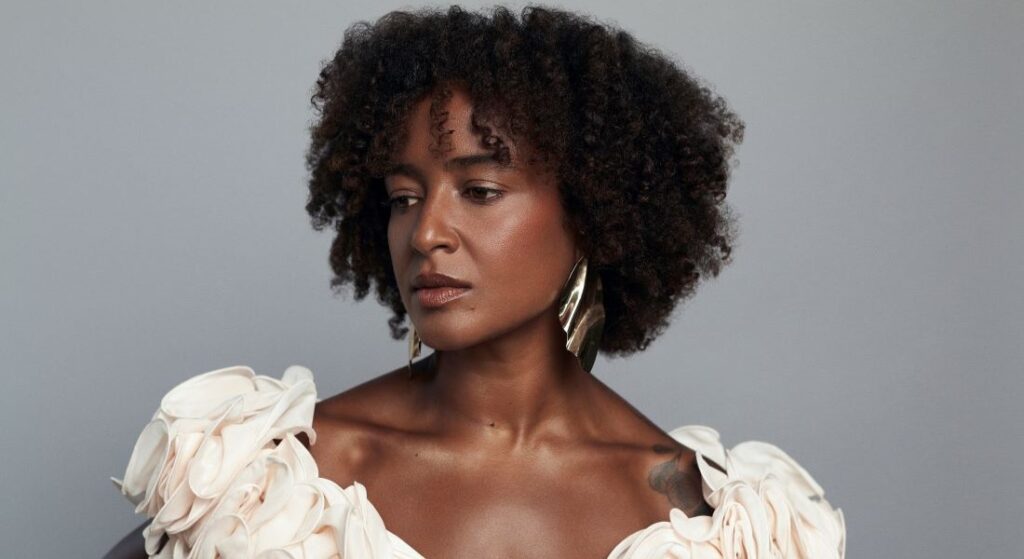
Does your daughter have an awareness of what your job is?
She does now, it’s been a slow realisation. I’m just her mum. I did a film that just came out this year called Greatest Days, a fun musical adaptation of a play called The Band. It’s a Take That movie!
For the cast and crew screening I took her as my plus one. For the first half of the film it’s us as our younger selves, young women playing us and they’re all being teenagers, which is exactly what she wants to be – she’s nine – so she watched it being like, “Amazing, I want to be like them”.
As soon as it became the older women taking the reins, I came on screen and she took my hand, put it in her lap, and held my hand for the whole film. At the end she jumped out of her seat and was screaming “Wooo!” and I asked “Did you like?”.
She said “Mummy, I didn’t like it, I loved it”. She was so proud and honestly, I don’t care about anybody else, the fact that she’s proud of me? I feel like I can hold my head up high.
We’ve heard Greatest Day is something of a tear jerker. What was it about the story that attracted you?
It’s just about mates. It’s about your female friends from childhood, and it really made me think of my girlfriends from school. We weren’t huge Take That fans but then suddenly in our GCSE year Never Forget came out. We got into a routine of standing in the hallway and singing the chorus to that song, so when I got that job I had to message them all!
You have a lot of stage experience too, what’s the appeal for you?
I love stage, it’s really magic. There’s something about it and that the experience is only happening right now, in this room. The doors are shut, it’s only us that know what’s happening… You did the play the night before, or perhaps a matinee, but this one is different.
The Olympic challenge of it is sustaining it, doing it every day and keeping it alive, keeping it true.
Some people say stage and screen acting are different but I believe good acting is good acting. You need to be heard – in the room there’s a vocal technique – but I still believe that truth is truth, and you can see it on-stage or on-screen.
We’re really looking forward to watching Bodies ourselves. When our readers get to see it, what do you hope they’ll take away from it?
The character in the most amount of pain is the one that causes the most damage… the message is about what happens in people’s lives when there’s an absence of love.



